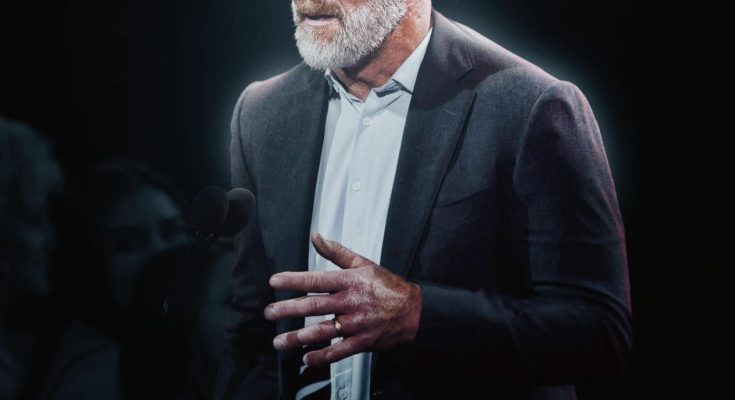Brett Favre, the legendary Green Bay Packers quarterback and Pro Football Hall of Famer, recently laid bare a harrowing chapter of his life: his struggle with Parkinson’s disease, which he disclosed publicly in September 2024. Now, in 2025, he’s speaking out again—more candidly, more personally—revealing how the disease has escalated and how it’s reshaping his daily existence in ways both subtle and frightening. In an appearance on “The Sage Steele Show,” he conveyed a deepening sense of unease, a quiet frustration, and a fierce determination to face each day despite a body that feel increasingly rigid and uncooperative.
Favre first revealed his diagnosis during a congressional hearing on September 24, 2024. At that moment, he was testifying before the House Ways and Means Committee amid scrutiny over his involvement in a Mississippi welfare funding controversy. It was then he took a moment away from the political noise to reveal something far more personal and somber: he had recently been diagnosed with Parkinson’s disease. He framed it with regret and advocacy, saying, “While it’s too late for me — because I’ve recently been diagnosed with Parkinson’s — this is also a cause dear to my heart,” noting that he had lost an investment in a company developing a concussion drug
At that hearing, Favre’s words cast a somber light on the long-term toll of his football career. He spoke of having endured “thousands” of concussions over two decades in the NFL, implicitly connecting this barrage to his diagnosis ). That admission helped underscore the urgent importance of addressing head injuries in sports and lent gravity to his efforts—even as controversy swirled around him.
Now, in this latest appearance, Favre offered a medical progress report—not through clinical detachment, but through an honest, unguarded human perspective. In the podcast, he said that Parkinson’s has crept beyond mere tremors—a symptom most commonly associated with the disease—and into profound rigidity. His joints, he shared, have grown stiff, especially on his right side, the dominant side for so much of his athletic life. In his own words, “I have rigid and stiff joints on my right side – really on both sides, but the right side is bothering me” (CBSSports.com).
That stiffness, he said, makes him feel like “a pretzel” or “a board” upon waking—rigid and resistant to movement. He contrasted his own form of Parkinson’s, where shaking is limited, with what the public often imagines; he emphasized that what he endures is more silence than spectacle: “Everyone attributes Parkinson’s with shaking … I have a little shaking, but not like Muhammad Ali or Michael J. Fox,” he explained (CBSSports.com, Fox News).
But perhaps the most unnerving new symptom isn’t rigidity—it’s difficulty swallowing. Breaths catch. Moments of dining or drinking can turn into panic, as he sometimes feels like he’s choking. “I’m having a hard time swallowing. There’s times where I think I’m choking. It’s sort of scary because they can’t fix that,” Favre confessed in a voice that trembled between defiance and dread (The Cold Wire, The Sun, Sportskeeda).
It was this physical vulnerability that cut through the aura of invincibility that Favre built in his playing days. The same mouth that threw pinpoint passes might now fail in the simple act of swallowing. He described how the swallowing difficulty staggered him, how it only underscored the cruel unfairness that there is no cure. “They can’t fix that,” he repeated—a phrase simple in construction, devastating in implications (The Cold Wire, The Sun).
Still, amid the fear there is defiance. He tries “not to think about it.” Instead, he pushes forward: “I try to just focus on getting after the day.” He clings to routine, to structure, to small victories. There are “times during the day, maybe at night, when I can decompress … and I think I’m progressing a little bit” (The Cold Wire, WCCS AM1160 & 101.1FM). That sense of progression may be fleeting, but it’s vital—a glimmer that even in a day overwhelmed by disease, moments of relief can exist.
Favre also spoke of how medication helps—but also of its limitations. He said he takes medicine every four hours to try to slow the progression, and that its effects can feel transformative—like a “total new body” twenty minutes after dosing (CBSSports.com). Still, he acknowledged the long-term implications: “I don’t want to keep taking medication for the next 30, 40 years if I live that long. But it is what it is,” he said with a weary acceptance (Fox News).
So this conversation is not only the news of diagnosis or progression—it’s the sound of a man learning to speak through stiffness, cough through fear, and breathe through swallowing trouble. It’s about adapting to a new limitations while resenting their presence.
Favre, at 55 years old, is contending with a disease without cure or reprieve. Parkinson’s—an incurable disorder of the central nervous system—is relentless, unpredictable, and deeply personal. It chips away at the body’s capacity for movement, coordination, balance, speech, and swallowing. Mechanics that once functioned effortlessly are now sources of terror. That terror is raw enough to suffuse his words with strain and candor.
Yet even as it advances, he resists being defined by it. He declines pity. He leans on resilience. He focuses on daily purpose, the fight for every morning’s stiffness, every meal’s safe swallow, every moment of vigor between medications. “I try not to think about it,” he reiterated, underscoring that in his world, distraction is a shield.
There is also more subtle grief—the grief of a man who watched his body once perform feats of precision, power, and grace, only now to betray him in the most basic functions. The quarterback who threw spirals, led comebacks, lived for fourth‑quarter drives—now must wrestle with swallowing, with stillness, with rigidity. The man who once carried millions in crowds and championships must now carry the weight of fear and physical decline. That contrast amplifies the tragedy.
At the same time, one detects gratitude. Gratitude for being alive, for clarity of mind, for fleeting moments of progress. “Most of the time, I’m good,” he said in one appearance, trying to remind himself—and perhaps his audience—that there are days when it feels okay, even if the next day may not be (Fox News).
Behind these words is also a stadium of emotion: fans, critics, family, foes, old teammates, doctors, everyday people watching and listening. Some of that crowd offers compassion; others cast skepticism. On platforms like Reddit, some users expressed that it’s painful to see a childhood hero suffer, while others questioned timing or motives. One fan wrote, “Best wishes and prayers to Brett Favre and his family” (Reddit). Another voiced a painful truth from personal experience: “My dad was diagnosed with Parkinson’s a couple years ago… Outside of my dad, Favre was my biggest childhood hero. This is a bit of a gut punch if I’m being honest” (Reddit).
But whether sympathy flows or skepticism sings, it doesn’t take away from the chasm the disease has opened in Favre’s life. Memory of victories, Hall of Fame, records and legends cannot shield a person from Parkinson’s—the disease respects no legacy.
And so Favre tells us what he is told by daily reality: that swallowing is no longer safe, that joints can be insistent as stone, that rigidity creeps in like a quiet occupier of the body. But he refuses to yield. He doses himself with medication as armor, welcomes moments of relief as victory, flinches but then stands upright again.
There is loneliness in this story—loneliness that echoes through the microphone lines of a podcast. There is defiance, too—defiance in facing a body that failed a thousand times in uniform, and now fails again in private. There is fear, but also fierce resolve. There is a disease that cannot be cured, but there is also a human spirit that refuses to be defined by it.
In the end, Favre’s voice reminds us that Parkinson’s isn’t only a medical label—it’s a claustrophobic, wrenching daily reality. Swallowing can be perilous. Medication cycles can be salvation. Stiffness can feel like immobility. And still—someone wakes up, shakes the board‑like body, fights gravity, fights fear, focuses on getting after the day. For now, that is enough.
Let me know if you’d like any tweaks—maybe a tighter emotional focus, or more detail on Parkinson’s disease context, or trimming to an exact word target.



